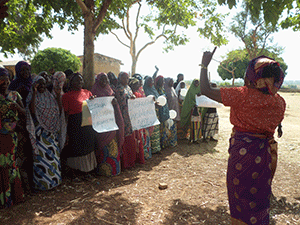Ngozi Eze, Nigerian country director for Women for Women International, calls on her team to integrate the public health directives into program trainings.
When the first case of Ebola was detected in Nigeria, the local ministries of health, civic leaders and media began disseminating information. In response, Ngozi Eze, country director for Women for Women International – Nigeria called on her team to integrate the public health directives into program trainings.
 “Our commitment to improving health and well-being includes providing relevant information on public health issues,” she explains. “We did this during the bird flu epidemic as well, because we know the challenge to marginalized women is multiplied because of isolation. Access to knowledge is the first line of defense.”
“Our commitment to improving health and well-being includes providing relevant information on public health issues,” she explains. “We did this during the bird flu epidemic as well, because we know the challenge to marginalized women is multiplied because of isolation. Access to knowledge is the first line of defense.”
Within two months, more than 5,000 women received guidelines on preventing transmission and recognizing symptoms. WfWI facilitators and program trainers encouraged the women to actively share information with family and friends. Encouraging each woman to use her voice and her knowledge to educate others was a key message from the trainers.
The information about preventing the spread of the disease is impacting behavior. For example, according to Ngozi, “women are conscious of not shaking hands indiscriminately.”
While most public health campaigns depend heavily on mass media to raise awareness and educate, this method does not work in isolated and rural regions. In these areas, community outreach is more effective and trusted. This is especially important when it comes to preventing the spread of a disease as frightening and poorly understood as Ebola.
Reports confirm that women are disproportionately impacted – in large part because of cultural practices that give women the primary role in caring for the sick. In addition, health workers including nurses and cleaners are often women. According to public health officials tracking the epidemic, nearly 60% of those who have died from the disease are women.
Women for Women International will continue to provide access to information that will help prevent the spread of this disease and connect women with resources that promote health and well-being.
To learn more, email general@womenforwomen.org for additional updates and background on our health and wellness work.
